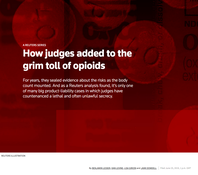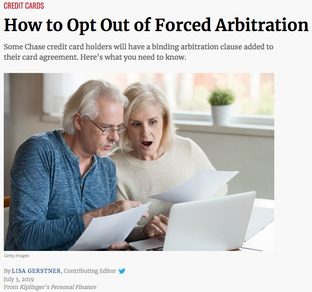The Federal Trade Commission recently slapped three companies who had form contracts that said the consumers could not post negative reviews about the products or services from the businesses. Worse, these form contract also had confidentiality clauses -- those said that the consumers would PAY money damages to the businesses if the consumers disclosed information they got while using the products or services was confidential.
|
REMEMBER: Federal law prevents businesses from sticking fine print into their contracts that prohibits you from writing or posting a negative review of the business! (The Consumer Review Fairness Act (“CRFA”) became law in March 2017.)
The Federal Trade Commission recently slapped three companies who had form contracts that said the consumers could not post negative reviews about the products or services from the businesses. Worse, these form contract also had confidentiality clauses -- those said that the consumers would PAY money damages to the businesses if the consumers disclosed information they got while using the products or services was confidential.
0 Comments
Good Washington Post Article on How Car Dealers Rip You Off with Financing
Ian Ayres is the William K. Townsend professor at Yale Law School. As websites such as Cars.com and TrueCar have made car pricing more transparent, auto dealers have turned to boosting their profits with hidden fees on loans. When a consumer chooses in-house financing with an auto dealer, the dealer sends the customer’s financial information to a lender and is told the rate that the customer qualifies for. But it’s legal for the dealer to turn around and charge the customer a higher interest rate. You might qualify for a 5.9 percent interest rate, but if the dealer can get you to agree to a loan at 11 percent, the lender will kick back more than $1,000 to the dealership as pure profit. This discretionary markup of the interest rate allows auto dealers to arbitrarily increase their fees. An analysis by the independent online auto-loan marketplace Outside Financial has found that dealers are charging an average markup of $1,791 per loan. By contrast, in 2003, Vanderbilt University economist Mark Cohen estimated that 10 percent of loans to Nissan’s borrowers were marked up more than $1,600. Now the average loan is boosted more than that. . . . Economists have had evidence for decades that car dealers tend to charge minorities higher prices. A series of studies I authored and co-authored in the 1990s found that auto dealers consistently charge black consumers prices that are hundreds or thousands of dollars more than their offers to white shoppers. These inflated prices can more than double the dealer’s profits compared with selling the same vehicle to a similar white customer. . . . The CFPB and other government agencies should be on the lookout for ways to better curtail dealership lending abuses. Yet instead of stepping up enforcement and protecting customers, the CFPB has rolled back rules on discriminatory lending practices and decreased enforcement of existing protections. Just last year, the Senate used the Congressional Review Act to overturn a CFPB rule that explicitly banned auto lenders from charging discriminatory fees on the basis of race. . . . Groups like the US Chamber of Commerce spend extraordinary sums of money on hired hack "scholars" whose mission is to produce propaganda that paints class action lawsuits in a bad light. Their goal is to destroy the class action form of lawsuit, so that their corporate backers can rip people off by the thousands and tens of thousands and not have to pay a price for it. A recently concluded (after 8 years) huge Oregon class action shows the truth, which is 180 out from the Chamber propaganda. The truth is this:
July 16, 2019 In Blog  Reuters has a must-read story with implications for everyone in America: "That evidence was clearly compelling: In a 2004 ruling, Judge Stephens rejected Purdue’s motion that he dismiss the case and sided with the state’s assertion that the material could convince a jury that Purdue’s sales pitch was full of dangerous lies. But Stephens sealed the evidence on which he relied in that ruling. And when Purdue and the state reached a settlement that year, before the case went to trial, the evidence remained hidden, out of sight to regulators, doctors and patients. Over the next few years, as OxyContin sales and opioid-related deaths climbed, more than a dozen other judges overseeing similar lawsuits against Purdue took the same tack, keeping the company’s records secret." Read the whole thing here: https://www.reuters.com/investigates/special-report/usa-courts-secrecy-judges/  A reporter for Kiplinger wrote a good article on arbitration and avoiding it in July 2019 -- available online: https://www.kiplinger.com/article/credit/T016-C000-S002-how-to-opt-out-of-forced-arbitration.html Remember, you have to act fast (by early August) and send Chase a regular, signed, snail-mail letter to keep them from forcing you out of court and into forced arbitration on many of their credit cards: From the Kiplinger story: Write a clear statement rejecting the arbitration agreement, and request a letter of acknowledgment from Chase. Include your name, account number, address and signature, too. Send the letter by certified mail (so that you can prove Chase received it) to P.O. Box 15298, Wilmington, DE 19850-5298. Customers who open a Chase card after the deadline can decline the arbitration clause, too. Good TV news story on "mortgage phishing" -- getting buyers to wire money to the scammers instead of to the sellers.
https://www.kezi.com/content/news/Phishing-scam-targeting-homebuyers-in-Oregon-and-beyond-511906211.html  Tell CFPB: Protect Consumers, Not Abusive Debt Collectors The Consumer Financial Protection Bureau’s proposed debt collection rule (Docket CFPB-2019-0022) would let debt collectors text you or email you without permission, and let them contact you up to 7 times per week, per debt, and would also let them file suits over debts without confirming the debtor’s identity or amount owed. The CFPB is accepting public comments on the new rule until August 19. Please take action today - Submit your comments on Docket No. CFPB-2019-0022, and spread the word! Encourage others in your network to help preserve strong consumer protections! Click the "Download File" link just below to see what's wrong with the proposed rule and the changes needed!
There are no “quick fixes” to clean up your credit  The Braille and Talking Book Program offers Veterans who have difficulty with regular print materials the return of the gift of reading. The Joy and Freedom of Reading Whether escaping into a great novel or staying current with popular magazines, the freedom and independence of reading are only a few steps away. This program, from the National Library Service (NLS) and the Library of Congress, provides talking books, audio magazines, and digital talking-book players free of charge. Any honorably discharged Veteran who is * blind * has low vision, or * a disability preventing the reading of traditional materials is eligible. Participants choose whether their selected reading materials are delivered by mail, downloaded from the web-based service BARD (Braille and Audio Reading Download) or through the BARD mobile app for smartphones and tablets. NLS maintains a vast catalog of titles and publications from the latest best-sellers to timeless classics. Plus, Veterans have preferential status in the lending of materials and equipment. The Braille and Talking Books Program is accomplished through a nationwide network of libraries to serve citizens and Veterans living inside the U.S. or abroad. Applying for this service is easy. Call the National Library Service at 1-888-NLS-READ (1-888-657-7323) or visit them on the web at www.loc.gov/ThatAllMayRead Veterans served to protect freedom. Now let National Library Service provide the freedom for all to read. |
AuthorJohn Gear Law Office - Categories
All
Archives
December 2022
|
||||||
 RSS Feed
RSS Feed
